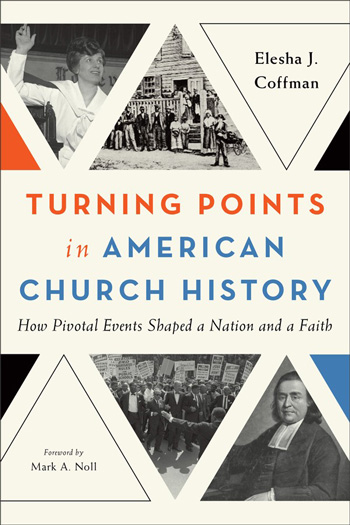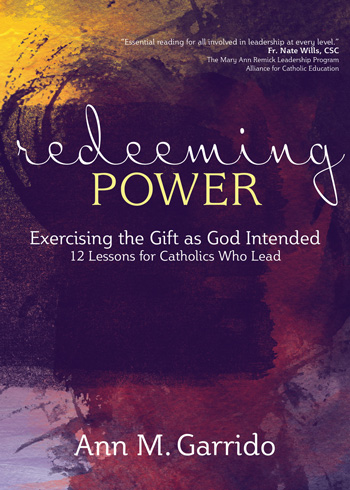Books

Turning Points in American Church History:
How Pivotal Events Shaped a Nation and a Faith
Elesha J. Coffman
Baker Academic, 2024
Baylor history professor Elesha J. Coffman explores what makes Christianity in the U.S. distinctive in Turning Points in American Church History: How Pivotal Events Shaped a Nation and a Faith (Baker Academic, 2024). She focuses on 13 historical events and developments that have shaped the “American Church” in all its diversity, while delving into military and legal history, science, politics, publishing and media, immigration, civil rights, education, volunteerism, and much more.
Coffman take readers from the Spanish Armada to the election of Donald Trump in 2016. These are captivating stories recounted by an expert storyteller and include plenty of citations and additional suggested reading.
The “Turning Points” format isn’t new; one of the author’s mentors, acclaimed historian Mark A. Noll, applied it in his Turning Points: Decisive Moments in the History of Christianity, published in 1998. It’s a cross between a sweeping survey and a detailed, single-subject study, which allows readers to get a fuller understanding of each point while also making broader connections. Coffman (and Noll, who wrote the foreword to this book), recognizes that, the format necessarily omits important points. That leaves it to the reader: which points would you choose to explain Christianity in America?

Redeeming Power:
Exercising the Gift as God Intended
Ann M. Garrido
Ave Maria Press, 2024
Teacher, preacher, healer—leader? Redeeming Power: Exercising the Gift as God Intended (Ave Maria Press, 2024) is an accessible little book offering deep insight about how Jesus exercised power, and how leaders today can emulate his model.
“All of us have stories in our minds about what being a person of power means,” author Ann Garrido writes, “and many of them are not good.” She suggests that we should consider it from a scriptural angle. In 12 chapters, she highlights 12 types of power – including the power to ask questions, to judge, to draw boundaries, and, eventually, to lay down power.
Garrido, an associate professor of homiletics at Aquinas Institute of Theology, combines her reflections on power in Jesus’ ministry and the book of Genesis with material from psychology and leadership studies, interviews with Christian leaders in a variety of roles about the challenges that come with power, and exemplar “companions for the journey” who wield power in spiritually grounded ways. This is the third title in Garrido’s “Redeeming” series; centered in the Catholic tradition, Redeeming Power is a valuable resource for Christian leaders of all stripes.
Films

Cabrini
Directed by Alejandro Monteverde
145 minutes
This biopic makes the case that Frances Xavier Cabrini deserves the title of “empire-building heavyweight” as much as Elon Musk or Steve Jobs. Cabrini, founder of the Missionary Sisters of the Sacred Heart of Jesus, was born in northern Italy in 1850. In 1899 she and six of her sisters arrived in New York City to serve the Italian immigrant population; she later established 67 hospitals, orphanages, and schools around the world. Mother Cabrini was canonized by the Catholic Church in 1938, just 21 years after her death from chronic endocarditis at age 67, and is recognized as a patron saint of immigrants.
With such an epic life for inspiration, the filmmakers wisely chose to focus on Cabrini’s early years in New York. Occasional flashbacks provide context, and the film’s conclusion highlights her legacy.
In addition to capturing grinding poverty and gilded wealth in New York, Cabrini captures the overwhelming task facing Cabrini, her sisters, and a handful of helpers. Beset with unsupportive superiors, inadequate funding, language barriers, sabotage, arson, racism, sexism, and more, Cabrini overcomes with resourcefulness, courage, tenacity, and faith. It is a joy to watch her lead in this lively, uplifting study in leadership that honors its towering protagonist.

Inside the Yellow Cocoon Shell
Directed by Thien An Pham
178 minutes
The storyline is simple: a man receives a call that his sister-in-law and young nephew have been in a traffic accident. He goes to the hospital and finds that while his nephew, Dao, is unscathed, his sister-in-law has died. The man, Thien, must then take Dao and his sister-in-law’s remains to their rural hometown for her funeral. Thien enrolls Dao in school there and attempts to find answers about his own brother, who went missing years ago.
The opening scenes show Thien, already wrestling with his faith, adrift in his life in the city. The sudden family tragedy plunges him deeper into wondering about divine will, suffering, meaning and, ultimately the existence of God.
Director Pham depicts rural Vietnamese Catholicism with subtlety and sophistication. The religious symbolism appearing throughout the film – birds, butterflies, wind, water, light, images of Mary – pairs with snippets of sermons, songs and silence to provide deeper context. The people Thien encounters have significant, sometimes mysterious messages for him as he stumbles into the unknown.
This full-length feature (Pham’s debut) packs so much visual and auditory beauty that viewers can – if they give themselves over to the demands of the three-hour film – be reminded of the extraordinary transcendence that permeates ordinary life.
Have you found an absorbing book, movie, or musical artist? Write to us: editors@intrust.org